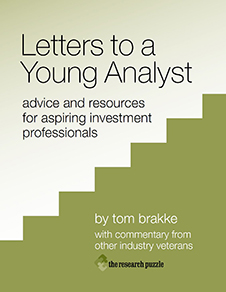
- Thursday, March 21st, 2013
- the illusion of certainty
-
The trouble with starting a series on a broad topic like equity research is that it could go on forever. I intended to add more chapters to the series that had been in progress,the research puzzle | This is the PDF index of the series, with introductions and links. but I am ending it early because of ten words that I read in a blog posting.
Ironically, the words I read had been written by John Hempton, who was the subject of one of the essays in that series.the research puzzle | It was called “talk about focus.” They are: “In money management what sells is the illusion of certainty.”
I was jolted out of my previous writing plan by that phrase and the one that followed, which said that “a fund manager who tells the truth (the truth being that he may be wrong at any time) is a more-difficult sale but a better investment.”Bronte Capital | Hempton’s posting ultimately concerns Roddy Boyd’s analysis of Brookfield Asset Management. I was not at all shocked by Hempton’s statements; in fact, I realized that in one way or another they reflected a theme that I deal with all the time.
For reference, you should know that I write about and offer consulting services to many different parts of the investment ecosystem. In a world of specialists, I am a generalist, connecting the dots across the industry for the benefit of readers and clients.
So, if “what sells is the illusion of certainty” and I’m working with an asset manager, should I encourage them to be illusionists and add to their assets under management? To craft a narrative that brings in the assets while not fully painting the picture of what they do and what the investor might experience? I’m sorry, I just don’t have it in me.
I remember my father (who sold financial products) telling me that if something is sold right, the client should understand what could occur across a range of scenarios. They might be disappointed when bad things happen, but they have been prepared in advance. That preparation makes for a harder sale, but a more honest one and a better one — the assets are stickier because they are there for the right reason.
A portfolio manager who is marketing to institutions might have a few chances a year to land a big account. Managers are taught to stick to a script (although many have a hard time of it), a script that shines a rose-colored light on the firm. The goal is not to educate the client — and usually not enough time is allotted to do that anyway — the goal is to win the business.
Investment advisors working with individuals are presented with the same dilemma. Their practice management metrics will all look better if they can offer a stylized version of the investment world versus the messy one that actually exists.Investment News | I recently wrote an opinion piece on “practice management” versus investment expertise for Investment News. Who wants to talk about uncertainty when a plan can look so tidy without it? And can a financial advisor be comfortable saying, “I don’t know,” even if that is the real answer?the research puzzle | That phrase was the cornerstone of an earlier posting that delves further into the question.
Therefore, those on the other side of the table — the buyers of investment services — have to bear the burden of the search for true understanding. That means peeling off layer after layer and looking for good questions rather than pat answers. Yet most buyers are not up to the challenge, lacking both the investment experience and the emotional fortitude to explore the dark corners of possibility on the investment horizon.
Just this week, quite by chance, I have discussed these dynamics with people that play each of the roles referenced above. It is inescapable for me to conclude that the illusion of certainty drives many of the issues that the investment business faces today, which is why Hempton’s words hit so close to home.
